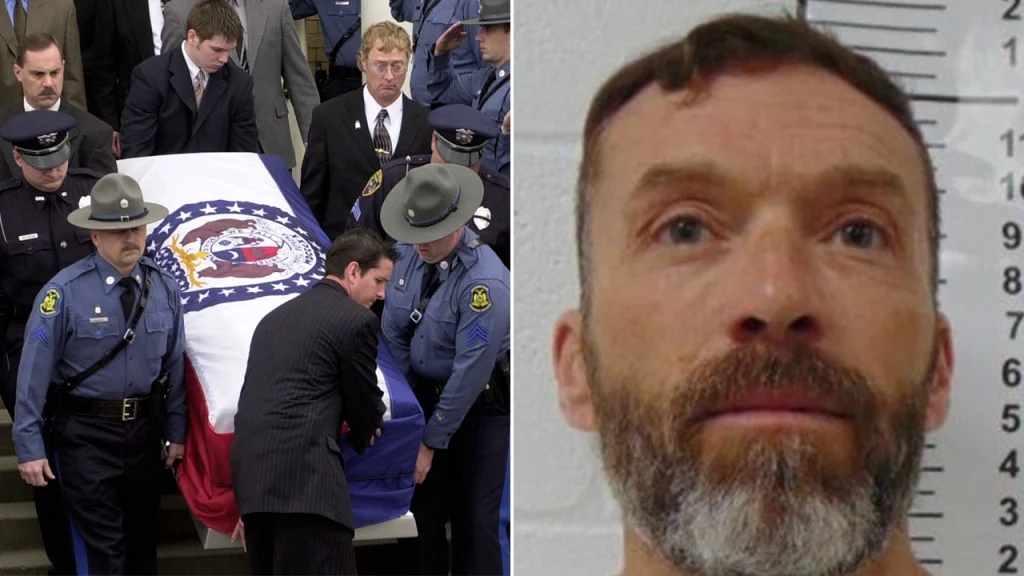The Execution of Lance Shockley: A 20-Year Journey to Justice
On a solemn Tuesday evening at the state prison in Bonne Terre, Missouri, 48-year-old Lance Shockley’s life ended by lethal injection shortly after 6 p.m., bringing closure to a case that spanned two decades. Convicted of the 2005 murder of Missouri State Highway Patrol Sergeant Carl Dewayne Graham Jr., Shockley maintained his innocence until the end, despite prosecutors’ assertions that he had meticulously planned the killing—waiting for hours near Graham’s home in Van Buren before ambushing the trooper with both rifle and shotgun fire as Graham exited his patrol vehicle. In his final moments, Shockley was granted the dignity of speaking with loved ones who witnessed his execution, though the soundproof glass created a poignant barrier to their conversation. His last hours included visits from his two daughters and a friend, and a modest final meal of oatmeal, peanut butter, and beverages. His written final statement quoted scripture from the Book of John: “So also you have sorrow now, but I will see you again, and your hearts will rejoice, and no one will take your joy from you.”
The path to Shockley’s execution was paved with numerous appeals and requests for a new trial, all of which were denied, culminating in the U.S. Supreme Court’s rejection of his final appeals on the very day of his execution. Governor Mike Kehoe reinforced the state’s position by denying clemency just one day before, declaring: “Violence against those who risk their lives every day to protect our communities will never be tolerated. Missouri stands firmly with our men and women in uniform.” This statement reflected the gravity with which Missouri views crimes against law enforcement officers, particularly in cases involving premeditated violence against those sworn to protect the public. The execution represented not just punishment for Shockley but a symbolic affirmation of the state’s commitment to protecting its protectors.
The prosecution’s case against Shockley centered on their claim that he killed Sergeant Graham to prevent an investigation into his role in an involuntary manslaughter case. According to prosecutors, Graham had been investigating Shockley for leaving the scene of a deadly accident that had claimed the life of his best friend. This motive painted a picture of a man desperate to avoid accountability, willing to commit an even more heinous crime to escape justice for a lesser one. After his March 2009 conviction, Shockley was sentenced to death two months later, though the case would continue through appeals for over a decade before the sentence was finally carried out.
Defense attorney Jeremy Weis highlighted what he considered critical weaknesses in the prosecution’s case, noting it remained “circumstantial” throughout. “The murder weapons were never found. There were disagreements between the ballistics experts hired by the prosecution,” Weis explained during a discussion at the University of Missouri School of Law. Perhaps most compelling was the defense’s claim that witnesses had placed Shockley approximately 14 miles from Graham’s home at the time prosecutors alleged he was lying in wait for the trooper. However, the state countered with evidence that Shockley had inquired about Graham’s residence before the killing and had attempted to dispose of .243-caliber ammunition around the time of the crime—details that ultimately proved persuasive to both jury and judges through years of appeals.
The execution of Lance Shockley marked Missouri’s first of the year, with no others scheduled for the remainder of 2025. This stands in stark contrast to the state’s last execution on December 3, 2024, when Christopher Collings was put to death for the sexual assault and murder of a nine-year-old girl. The relatively infrequent use of capital punishment in Missouri reflects broader national trends, where executions have generally declined across most states that maintain the death penalty. However, Shockley’s execution coincided with another lethal injection carried out the same day in Florida, where 72-year-old Samuel Lee Smithers was executed for killing two women in 1996, bringing Florida’s execution count to a record fourteen for the year.
As the sun set on Lance Shockley’s life, the case brought into focus the complex interplay between justice, punishment, and closure for victims’ families. For Sergeant Graham’s loved ones, the execution may have provided a sense of finality after twenty years of legal proceedings and waiting. For Shockley’s daughters and friends, it represented the painful end of a long journey marked by visits through prison glass and hopes for legal interventions that never materialized. And for society at large, it served as a somber reminder of the ultimate price exacted for the most serious crimes, particularly those targeting the men and women who serve in law enforcement. As Missouri closed this chapter in its criminal justice history, the questions that surround capital punishment—its effectiveness, its morality, and its application—continue to resonate in courtrooms and communities across America.


